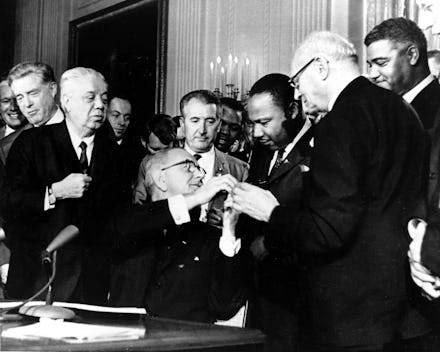Civil Right Act Anniversary: A Victory for People of Color, on This Day in 1964

When President Lyndon B. Johnson sat down to sign the Civil Rights Act on July 2, 1964, white lawmakers crowded around him to witness history. But Lyndon beckoned to civil rights icon Rev. Martin Luther King, Jr., who had lobbied the president for legislation aimed at ending racial discrimination.
Since then, Congress hasn't agreed on a more sweeping piece of legislation that struck at the heart of the country's founding principles.
The Civil Rights Act did three major things for women and people of color:
It outlawed discrimination based on race, color, religion, sex or national origin.
That meant government agencies at the federal and state levels could not treat citizens differently based on any of those characteristics.
It codified the Supreme Court's ban on racial segregation in schools, outlawed discrimination in employment and opened places of public accommodation to people of color.
This was especially important in the South, where Jim Crow laws relegated minorities to substandard public facilities or kept them out of white-run dining and retail establishments.
It outlawed barriers erected to prevent black Americans from registering to vote, including poll taxes and literacy tests.
However, civil rights leaders had to go back to the president and Congress for voting rights legislation a year later. Language in the Civil Rights Act didn't go far enough to protect against other forms of voter disenfranchisement — which also include redistricting and polling place closures.
Today, members of the LGBTQ community still lack explicit protections against employment discrimination based on sexual orientation and gender identity. In 28 states, LGBTQ people can legally be fired because of who they are.
Activists have argued that such protections should be extended to other groups in the wake of historic expansions of LGBTQ rights like same-sex marriage.
Read more: